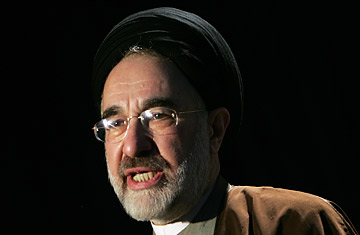
Former Iranian president Mohammad Khatami.
After his two-term stint as President of Iran that ended in 2005, Mohammed Khatami appears reluctantly ready for act three. Known as the most liberal but least effective President since the Iranian revolution, Khatami put an end to months of widespread speculation surrounding his political comeback on Feb 8th by announcing his plan to run against incumbent Mahmoud Ahmadinejad in Iran's Presidential election in June.
Though Iran's bleak economic climate, surging inflation and international isolation are ripe grounds for an upset victory for Khatami, his legacy as an innovative reformist who introduced women into the political mainstream and welcomed dialogue with the West has already been marred once by a failure to successfully follow through on reforms in the face of opposition by hard-line critics. (See the top 10 Ahmadinejad-isms.)
Fast Facts:
•Born in 1943 in the Yazd province of central Iran. As the son of a revered Ayatollah, Khatami grew up in a strictly religious household. He has achieved the third-highest level of Islamic clerical rank.
•He is a direct descendant of the Prophet Mohammed.
•Though his interest in Western philosophy was unusual among Iranians at the time, Khatami pursued an undergraduate degree in the field at Esfahan University.
•After completing his mandatory two-year stint in the Iranian Army, Khatami went on to become the editor-in-chief of the popular Iranian newspaper, the Kayhan Daily and later was appointed to the Iranian Parliament.
•He was forced to step down from his post as head of the Ministry of Culture and Islamic Guidance in 1992 after conservative clerics criticized his liberal stance on press freedoms.
•Elected President in landslide victories in 1997 and 2001. Ran on a moderate platform that focused on increased social freedom, a stronger democratic process and extensive economic reform. He was especially popular with the country's women and youth and received the endorsement of outgoing president Hashemi Rafsanjani during his first campaign.
•Agreed to a temporary suspension of uranium enrichment to appease the West.
•Despite the overwhelming support from the public for his policies, the Ayatollah Khameni's disapproval of Khatami's reform plans led to a deterioration of political and social freedoms towards the end of his second term, stalemating the rest of his political agenda.
•Despite being badly burned the last time around, Khatami will run on a reformist platform for the 2009 election- seeking to improve Iran's standing on the global stage, both politically and economically, and loosen governmental control over social and religious freedoms.
See pictures of the rise and fall of the Shah of Iran.
Quotes About:
"We welcome this turn of events."
—David Bar-Illan, an aide to Prime Minister Benjamin Netanyahu of Israel, on Khatami's 1997 election. (NYT, May 26th, 1997)
"This is a man who went on public buses. He's the kind of baby-kissing politician we're used to here in the United States. He rolled up his sleeves publicly and gave blood. He tries to straddle the world of Islam and Islamic clericalism, and the world of the people."
—Elaine Sciolino, New York Times correspondent, on Khatami's groundbreaking reelection campaign. (BBC, June 6th 2001)
"Khatami represents moderation in the Muslim world."
—Lebanon's late former President, Rafik Hariri (AFP, May13, 2003)
"He didn't know about the challenges, about the difficulties of this process of reform, but this time he knows very well about... the obstacles in front of the reform process and the difficulties of implementing the reform process in Iran."
—Elaheh Koolaee, a member of Iran's Parliament during Khatami's first administration, on his evolution as a candidate. (Wall Street Journal, February 9th, 2009)
"Khatami is running to counter Ahmadinejad's foreign policy, domestic policy, all his policies."
—Mohammad Ali Abtahi, former vice-President of Iran, on Khatami's objectives for his latest Presidential campaign. (Washington Post, February 9th, 2009)
Quotes By:
I would have preferred to serve the Revolution in another position."
—On his reluctance to run for re-election in 2001 after suffering crippling opposition from hard-line conservatives during his first term. (BBC, May 4th 2001)
"A crime, a disaster, it cannot be justified."
—On the September 11th attacks (The Independent, May 12th, 2003)
"If this nation says that they do not want us, we will leave."
—Responding to criticism of his inaction during his presidency. (CNN, June 12th, 2003)
"We have repeated so many times, myself the Supreme Leader and other officials, that we are not following the path of pursuing nuclear weapons. It's not important what machinery we have, it's important that we are not pursuing nuclear weapons."
—On Iran's nuclear ambitions. (Reuters, November 12th 2004)
"My policies might not have borne any fruit, but I still believe that they were and are useful."
—Defending the failed agenda he pursued during his presidency. (Washington Post, February 9th, 2009)
